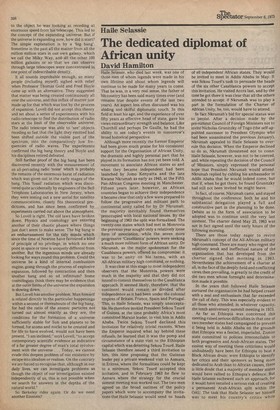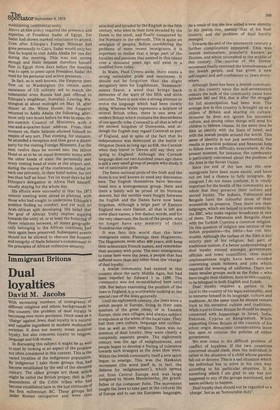Haile Selassie
The dedicated diplomat of African unity
David Hamilton
Haile Selassie, who died last week, was one of those men of whom legends were made in his own lifetime and about whom legends will continue to be made for many years to come. That he was, in a very real sense, the father of his country has been said many times over (and remains true despite events of the last two years). An aspect less often discussed was his abiding and skilful diplomatic touch. In this field at least his age, and the experience of over fifty years as effective head of state, gave his views extraordinary strength and balance. Like Churchill and perhaps De Gaulle, he had the ability to see today's events in tomorrow's broad historical perspective.
Although more recently the former Emperor had been given much praise for his consistent support for the Organisation of African Unity, the dramatic and highly personal part that he played in its formation has not yet been told. A movement to associate African states as and when they became independent had been launched by Jomo Kenyatta and the late Kwame Nkrumah as early as 1945, at the Fifth Pan-African Congress meeting in Manchester. Fifteen years later, however, as African countries began to achieve their independence it became clear that only a few were prepared to follow the progressive and militant path to continental unity called for by Dr Nkrumah: the majority inevitably found themselves preoccupied with local national issues. By the beginning of 1963 the split was formalised. The twenty-one states which had met in Monrovia the previous year sought only a relatively loose form of association, while the seven more progressive 'Casablanca' powers were seeking a much more militant form of African unity. Dr Nkrumah, as the major spokesman for the Casablanca powers, offered no compromise: it was to be unity on his terms, with an All-African military high command, or nothing.
It was clear at this stage to most independent observers that the Monrovia powers were much in the majority and that they did not intend to commit themselves to the Casablanca approach. It seemed likely, therefore, that the continent would remain as divided after independence as it had been under the colonial empires of Britain, France, Spain and Portugal. This, to Haile Selassie, was simply unacceptable. He therefore invited President Sekou Toure of Guinea, at the time probably Africa's most committed Marxist leader, to visit him in Addis Ababa. Twice Sekou Tour a declined this invitation for relatively trivial reasons. When the Emperor inquired what lay behind these refusals, he learned that it was the pomp and circumstance of a state visit to the Ethiopian capital which was deterring Sekou Toure. Haile Selassie therefore issued a third invitation to him, this time proposing that the Guinean leader pay a private weekend visit to Asmara, in Eritrea, where the formalities could be kept to a minimum. Sekou Toure accepted this invitation, and in February 1963 he flew to Asmara where the strategy for the crucial summit meeting was worked out. The two men agreed on the broad outlines of the policy papers which were to accompany the invitations that Haile Selassie would send to heads of all independent African states. They would be invited to meet in Addis Ababa in May. It was Sekou Toura's task to persuade the heads of the six other Casablanca powers to accept this invitation. He visited Accra last, and by the time he got there it was clear that all the others intended to accept: if Nkrumah was to play a part in the formulation of the Charter of African Unity, he, too, would have to attend.
In fact Nkrumah's bid for special status was to persist. After a decision made by the pre-summit Council of Foreign Ministers not to invite Nicholas Grunitzky of Togo (the self-appointed successor to President Olympio who had been assassinated the previous January), Nkrumah appealed to Haile Selassie to overrule this decision. When the Emperor declined to do so, Nkrumah threatened not to come. ' Haile Selassie, however, was not to be coerced, and, while repeating the decision of the Council of Ministers, simply expressed the personal hope that President Nkrumah would attend. Nkrumah replied by cabling his ambassador in Addis Ababa that he would indeed come, but that if, when he got there, he found Grunitzky had still not been invited he might leave.
In fact, of course, Nkrumah came, and stayed throughout the conference: both he and his substantial delegation played a full and constructive part in the planning to be done. Debate as to the form of association to be adopted was to continue until the very last moment. The charter dated May 25, 1963 was not in fact signed until the early hours of the following morning.
There are those today eager to revive Nkrumah's concept of the All-African military high command. There are many who regret the relatively weak and ineffectual nature of the organisation that has developed from the charter signed that morning in 1963. Nevertheless the achievement of a charter at all, in the face of the deeply-held and conflicting views then prevailing, is greatly to the credit of the two men whose foresight and determination made it possible.
In the years that followed Haile Selassie nurtured the organisation he had helped create with a zeal and enthusiasm that far exceeded the call of duty. This was especially evident to all those who attended, in whatever capacity, the tenth anniversary summit meeting in 1973.
As far as Ethiopia was concerned this meeting raised serious difficulties in that one or two member states had campaigned to prevent it being held in Addis Ababa on the grounds that Ethiopia was a fascist, imperialist, Zionist state committed to policies irreconcilable CO both progressive and Arab-African states. The easiest Way of meeting these criticisms would undoubtedly have been for Ethiopia to beat a Black African drum: were Ethiopia to identify her critics and their sponsors as being more dedicated to Arab than to African causes, there is little doubt that a majority of member states would have rallied to Ethiopia's defence. But Haile Selassie eschewed such an approach, for it would have entailed a serious risk of creating a permanent Arab-African split within the OAU. The task that Haile Selassie set himself was to meet his country's critics while
%ape etazor September 6, 1975
maintaining continental unity.
Above all this policy required the presence and expertise of President Sadat of Egypt. Yet Sadat had shown marked reluctance to attend. Even after Ethiopia's Foreign Minister had gone personally to Cairo, Sadat would only say that he hoped to visit Addis Ababa for one day during the meeting. This was not strong enough and Haile Selassie therefore himself flew to Egypt three days before the meeting was to open to press upon President Sadat the need for his personal and active presence.
In fact, as is well-known, the Emperor then flew on to Washington (to obtain some assurance of US military aid to match the substantial arms Russia had just offered to Ethiopia's neighbour, Somalia). Leaving Washington at about midnight on May 16, after dinner at the White House, the Emperor returned to Addis Ababa the following afternoon only two hours before he was to open the pre-summit Council of Ministers with a one-and-a-quarter-hour address. From that moment on, Haile Selassie allowed himself no respite of any sort. That evening, for instance, he attended a reception and then gave a dinner Party for the visiting Foreign Ministers. For the next twelve days he moved into the Hilton Hotel so as to be on equal domestic terms with the other heads of state. He personally met every visiting head of state at the airport and, during the course of the conference, called on each one privately, in their hotel suites, for not less than half an hour. Yet on most days he led Ethiopia's delegation in Africa Hall himself, usually staying for the whole day.
His efforts were successful in that the 1973 summit meeting went ahead as planned, with those who had sought to undermine Ethiopia's Position finding no comfort, and yet with no Arab-African split developing. His belief that the goal of African Unity implies aspiring towards the unity of, or at least the fostering of closer relations between, all states geographically belonging to the African continent had once again been preserved. Subsequent events Should not be allowed to obscure the honesty and integrity of Haile Selassie's commitment to the principles of African collective security.



































 Previous page
Previous page